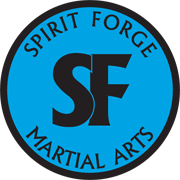Welcome to Spirit Forge Martial Arts inaugural blog post!
I thought the appropriate place to start what I hope will be an ongoing discussion concerning martial arts is an explanation of the origin of our school’s name. The name, “Spirit Forge Martial Arts,” is an excerpt from a famous quotation by the legendary seventeenth century Japanese swordsman, author and calligrapher, Miyomoto Mushashi (1584-1645)-“One thousand days just to forge our spirit, ten thousand days to polish what we have forged.” It is recorded that Mushashi was victorious in sixty-four duels before retiring to a life of contemplation, writing and calligraphy. It was during this period of his life that Mushashi wrote his seminal work, Go Rin no Sho, or, Writings on Five Elements. Mushashi’s observation is simple, yet profound; the path to martial arts excellence is ceaseless practice. This principle is at the center of our training at Spirit Forge Martial Arts and is embodied in the kicking drills of Taekwondo and Uchi Komi in Judo. Martial arts literature is replete with expressions of this idea: “Polishing the mirror;” “Sharpening the sword.” My fifty-five years as a martial artist have taught me that, while there are a multitude of approaches to martial arts training-the number seems to multiply daily!-the one true path is simple: dedicated, consistent practice. It is for this reason that Mushashi’s quotation inspired the name of our school.
I first encountered Mushashi’s insight in slightly different form in the voice of Sosai Masutatsu Oyama, the founder of Kyokushi Karate. Oyama, born in Korea in 1923, later immigrated to Japan at the age of fifteen, was a lifetime martial artist of rare accomplishment, achieving the ranks of 4th Dan in Shotokan Karate, 7th Dan in Goju-ryu Karate and 4th Dan in Judo before founding Kyokushin Karate. Oyama is also renowned for his ascetic, disciplined training, best exemplified by his isolated mountain training, initially on the slopes of Mt. Minobu, later on Mt. Kiyozumi, in Japan where he trained for twelve hours a day, meditating under ice cold waterfalls, running, jumping over boulders and using trees as makiwara (forging posts). Masutatsu Oyama’s extraordinary dedication to rigorous training finds expression in a number of his famous quotations: “The way is in training,” and when asked to how to achieve excellence in martial arts, replied (my favorite!), “Train. Train more than you sleep.” Although born centuries apart Masutatsu Oyama’s approach to martial arts echoes that of Miyomoto Mushashi: train, simply train. Oyama echoes Mushashi’s famous quotation in his Zayu no Mei Juichi Kajo, Eleven Mottos of Martial Arts, where he states, “The Martial Way begins with one thousand days and is mastered after ten thousand days of training.”
On a related note…when I was a young martial artist studying Koseido Jui-Jitsu and Koseido-ryu Karate, there were few resources available to martial arts students outside of the dojo. In fact, there was only Black Belt magazine and a few Karate and Judo texts (!), including Masutatsu Oyama’s, This Is Karate. Fortunately, I shared a copy of this tome (subsequently lost and replaced with a first edition!) with my brother and found in a latter section (Section 6 Chapter 20, Development, 2.), a fascinating discussion of, “Spiritual Chakuriki. ” The word,”Chakuriki,”(cha-rywk in Korean) is literally translated as, “borrowed strength.” a concept which has great significance for the Korean people. Although the term translates as, “borrowed strength,” taking strength from some other source and adding it to one’s natural strength, it actually means,”…increasing your bodily power through medicines, artificial devices and training” (This is Karate, Masutatsu Oyama, Chapter 20, Development, 2b. Chakuriki, p.312). I don’t know the specific medicines referenced, nor the artificial devices, but certainly rigorous training (again!) is central to this concept. The discussion concerning Spiritual Chakuriki concludes by stating, “Spiritual Chakurki, by developing an outstanding spiritual power and a physical strength like that of the animals, makes a man something like the ancient Sphinx with the face of a man and the body of a lion.” Even as a young teenager (I began serious training at the age of twelve) I was inspired by this quotation and the promise that it held.
“One thousand days just to forge our spirit, ten thousand days to polish what we have forged.”
Master Christopher D. Moore
